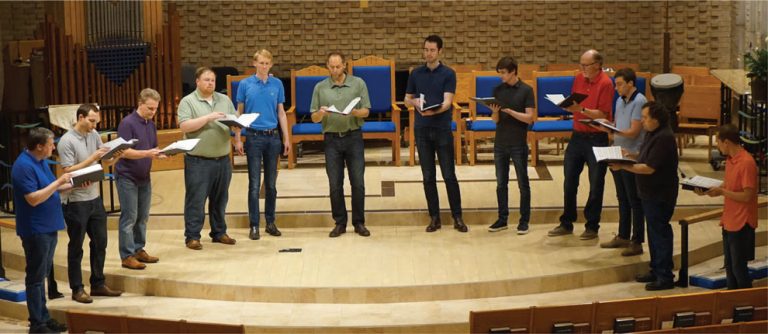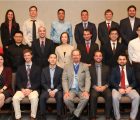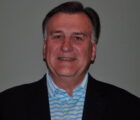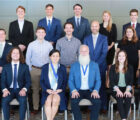
In the classic 1991 movie The Commitments, a scrappy group of Irish musicians come together to form an R&B band. In one of the opening scenes, every person who auditions for the band is asked the question, “Who are your influences?” Spoiler alert: No one auditioning has any R&B experience.
The singers who have come together to form the Travelers Men’s Actuarial Choir at Travelers in St. Paul, Minnesota, faced a similar dilemma. Their musical influences ranged from The Pirates of Penzance to a brass quartet to Ozzy Osbourne. A baker’s dozen of singing actuaries, the group tackles the challenging art of singing in close four- and eight-part harmonies. What’s more, they sing a cappella — without any instruments to guide or assist their voices — a style new to nearly all of them.
The daring enterprise is only in its fourth year, but it’s part of a surprisingly long tradition of actuarial choirs. The Travelers Chorale in Hartford, Connecticut, founded in 1924, claims the title of the oldest company-affiliated choir in the United States. Highlights of its long history include broadcasting Christmas carols on the radio and singing at the 1965 World’s Fair in New York City.
In St. Paul, a mixed choir of both men and women has been gathering each fall since the 1930s to practice holiday music that they perform in December. Trumpet player and CAS Fellow Chris Westermeyer, who currently leads the firm’s workers’ compensation product team, was excited to find a musical outlet at work when he arrived at Travelers. He joined the mixed choir during his first year with the company.
More than 10 years later, Westermeyer noticed that musical entertainment was missing from the company’s annual summer boat cruise. “I got the idea,” he says, “since we have so many men [who are] actuaries who sing, that we could get a group together to sing on this boat cruise.” There was only one problem, according to Westermeyer. “When we’re on a boat, there’s no piano.” Out of necessity, the group became an a cappella choir. Westermeyer picked the music, a repertoire ranging from traditional ballads like Danny Boy to classical pieces, Over the Rainbow and songs by Billy Joel. The choir debuted at the company’s 2016 boat cruise.
Westermeyer, who usually sings bass, brings a wealth of musical experience to his role of organizing the group, even though singing isn’t his main musical focus. “I am mostly a trumpet player by training,” he says. He currently plays the trumpet in the Minnesota Symphonic Winds and a brass quartet in addition to a gig with the Lake Wobegon Brass Band, a traditional 30-piece British brass band that tours overseas.
Joining Westermeyer in the men’s choir that first year was tenor Ben Mesick, who is currently one exam away from earning his ACAS designation and is working in his second rotation in the five-year Travelers Actuarial Analytics Leadership Development Program. Like Westermeyer, Mesick sees himself as more of an instrumentalist than a singer. “I mainly would consider myself a guitar player,” he says. In high school, Mesick played in a rock and metal band with a set list that ran from Guns N’ Roses’ Sweet Child of Mine to Ozzy Osbourne’s Crazy Train. After graduating from high school, Mesick earned an associate’s degree in guitar performance from McNally Smith College of Music in St. Paul. “That was great,” he says, “but I realized it’s tough to make a living in music pretty quickly. So, I went back to the University of Minnesota and got a bachelor’s in math there, with the idea of becoming an actuary.”
They soon recruited baritone Kevin Hanson, whose musical past includes stints as a tuba player in the marching band at his high school and at Drake University. Hanson, an FCAS who specializes in predictive modeling, had also sung in choirs his freshman year at Drake, and was disappointed to find out that he’d missed the auditions for the Gilbert and Sullivan operetta The Pirates of Penzance by one day. “But I went to see the people in charge anyway,” he says, “and they said, ‘We’d love to have you. We can always use more pirates!’” Surrounded by theater and music majors, Hanson says, “I was the only actuarial science major in the opera.”
The Men’s Actuarial Choir seems to embody the common observation that people who are skilled with math can have a knack for music as well. Mesick has seen that connection in his own work and feels that the two skills share a similar learning process.
“When it comes to practicing music,” he says, “you sit down, you don’t know how to do something, and then you run through it a bunch of times, until you get it into your fingers, and you figure it out. And I feel like it’s similar for math, for example, learning how to do integrals. You start out, you don’t know how to do it, you look at a bunch of problems, you work through them. And then at some point, it kind of clicks, and you get it.”
Most of the choir’s members divide the year between the larger mixed choir, which practices holiday music between September and December, and the men’s choir, which begins rehearsing in January for the company’s boat cruise in July, and then disbands until after the holidays. What makes all those rehearsals worth it? “I love making music, and doing it really well. And this group of guys is really good,” says organizer Westermeyer.
Hanson enjoys “the challenge of singing a cappella,” he says. “You have to depend on each other, for everyone to sing their part and sing it well — and there are some way better singers in the choir than me!” Ben Mesick finds the group has given him an easy way to include music in his working life. “I’ve been doing music for most of my life, and it’s nice to have that structured group now that I’m working and not in school anymore.”
This year, the choir decided to tackle two new challenges: a benefit concert and Taylor Swift. After four years of singing at retirement parties and performing mini-recitals at work, in addition to the annual boat cruise, “we decided we’ll put on our own little concert in the evening,” says Westermeyer, “and do it as a fundraiser for Habitat for Humanity, which is a group that Travelers has long supported, both through donations as well as through volunteers to work on houses.”
The June concert raised $1,300 in donations, and it featured Taylor Swift’s pop hit Shake It Off, a song requested by a coworker. According to Ben Mesick, “The big thing is the dance moves that we added. So, we spent most of our rehearsal time this year just working on that one song.”
Chris Westermeyer may direct two choirs and play in three bands, but he’s not a dancer. So, he turned to coworker Christina Kyllo, who is currently taking exams for her actuarial credentials and is in her third year of the Actuarial Analytics Leadership Development Program. Kyllo competed with the ballroom dance team at the University of Minnesota and currently dances and competes in West Coast Swing. “When Chris Westermeyer first asked if I’d choreograph their dance,” says Kyllo, “I was a little apprehensive because I’ve only done partner-style dancing. But I was also excited because I knew the choir would be a great crew to work with and being part of their T-Swift debut sounded like so much fun.”
For more help with the choreography, Kyllo recruited Brooke Smith, FCAS, who’s in her fourth year of the Actuarial and Analytics Leadership Development Program at Travelers and started dancing at the age of two. Smith competed in dance in high school and at Drake University.
Smith says their goal was to make the choir’s moves “humorous, without making anyone feel embarrassed, and also fun to watch. We did fun things like split the group in half and have them perform different moves to make it more interesting for the audience to watch.” The choreographers found a soloist in Chris Westermeyer’s son, Zach Westermeyer, who recently passed his exams to become an ACAS. “I think he had hardest part,” says Smith, “as we encouraged him to enthusiastically improv for much of his part. Believe it or not improv is often much harder than performing a prepared routine, plus he is performing those moves alone!”
The rehearsal process went smoothly, according to Kyllo, who says, “Since they’re a group of musicians and already understand music so well, they were really good at picking up the timing of the choreography.” She didn’t see the final result until the benefit concert in June, where she says, “There was no question that they put on a fantastic show, and the audience loved it.”
For Kevin Hanson, that kind of audience reaction is part of what makes performing in the choir worthwhile. “It’s fun singing for coworkers and seeing the enjoyment they get out of it,” he says. “The whole actuarial community is very supportive about coming to listen to us when we do mini-recitals in the common area.” When the choir sang at a retirement party recently, he rewrote the lyrics of the song Hard Times, Come Again No More, changing the title to “Pam Doesn’t Work Here Any More,” a witty commentary on his colleague’s life at the office and her sunny plans for the future. Hanson explains, “I rewrote some of the lyrics, sort of as a retirement gift. That was a lot of fun — getting to give that gift.”
Chris Westermeyer enjoys an added bonus to singing with his coworkers: These days, he’s also singing with his son, Zach, who joined the company in 2015. “It’s great to have the opportunity to work at the same company as my son and to sing in the choir with him,” Westermeyer says. “He’s a much better singer than I am, so I’ve learned a lot from him.” As the choir’s organizer, Westermeyer hears kudos from his coworkers. After a recent performance, he says, “Someone who was in St. Paul from the Hartford office came up to me afterwards and said our singing alone made her trip out to St. Paul worthwhile.”
Ben Mesick sees a future in which the Travelers Men’s Actuarial Choir is no longer as uncommon as it is today. “For other large companies,” he says, “if they’ve got a lot of musical actuaries, I’d encourage them to try it out. I think it’s a lot of fun.”
The choir also includes CAS Fellows David Iverson, Alex Kranz, Cale Nelson, Peter Soulen and Rick Sutherland; CAS Associates Trevor Franda, Eric Zange and Kevin Zech; and Matt Cole.
Laurie McClellan is a freelance writer and photographer living in Arlington, Virginia. She is on the faculty of Johns Hopkins University, where she teaches in the M.A. in Science Writing program.
Read More: The Math-Music Connection
The blockbuster book, Gödel, Escher, Bach: An Eternal Golden Braid, by Douglas Hofstadter, celebrates its 30th anniversary in 2019. Winner of both a Pulitzer Prize for nonfiction and a National Book Award for science, the book investigates links between the work of mathematician Kurt Gödel, optical illusion artist M.C. Escher and composer Johann Sebastian Bach. Time named the book to its list of top 100 nonfiction books of all time, with reviewer Lev Grossman writing, “Ordinary language can’t convey Hofstadter’s ecstatically brilliant improvisations: He uses paradoxes, palindromes, dramatic dialogues, kans, diagrams, symbolic logic, musical scores and, where necessary, terrible puns to braid music theory, mathematics and the visual arts into one single strand that leads the reader deep into the mystery of how the mind works.”
Host an actuarial sing along!
Kevin Hanson rewrote the lyrics to this common tune, usually sung as a round, to give it a more mathematical bent (and to give actuarial audiences a chance to participate). Sing it to the tune of Are You Sleeping? (also known as Frère Jacques).
Statisticians
Sta-tis-ti-cians, Sta-tis-ti-cians,
Let’s pre-dict! Let’s pre-dict!
Give us all your data,
We’ll give you some factors,
Not hand-picked, not hand-picked.











